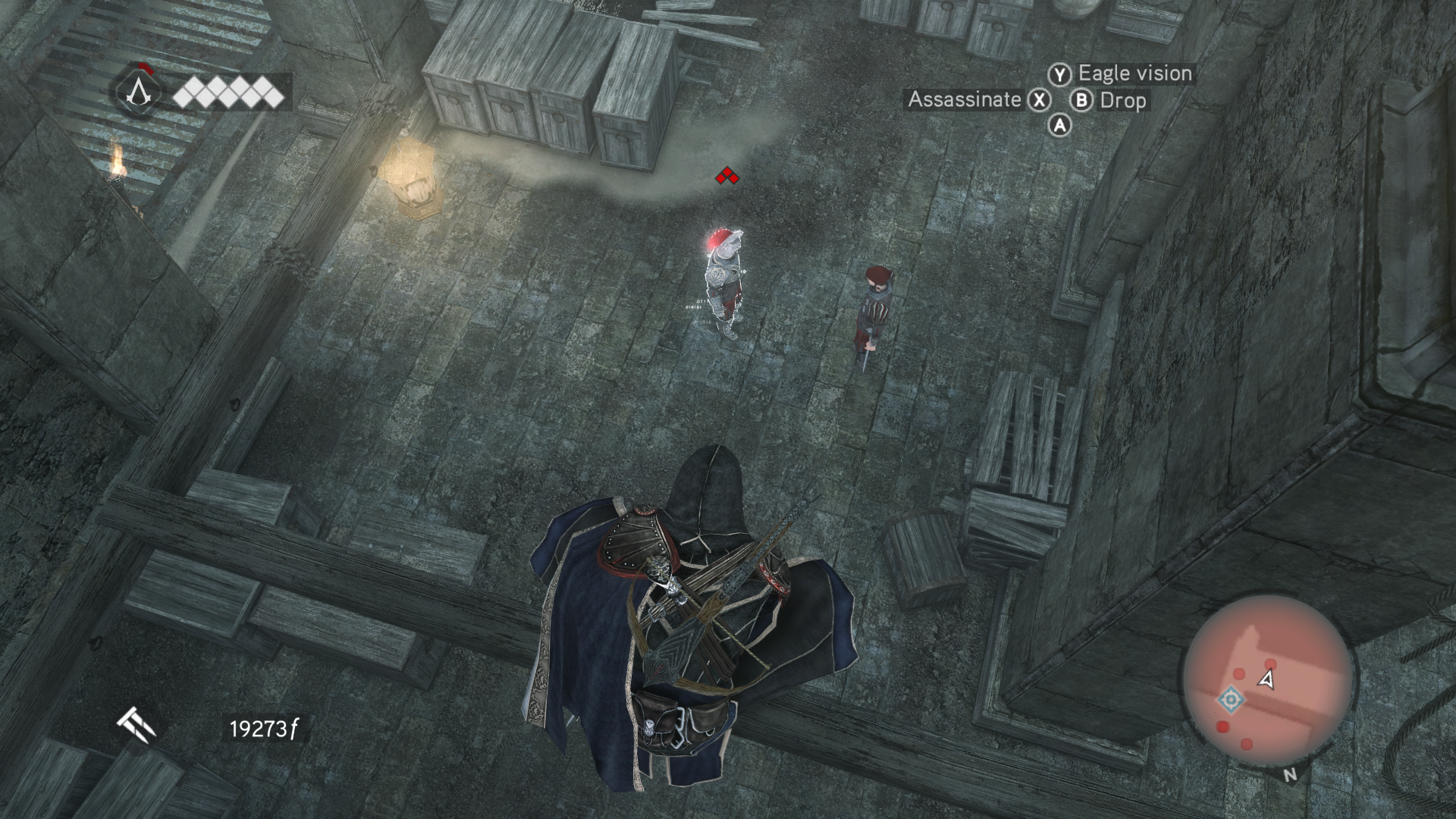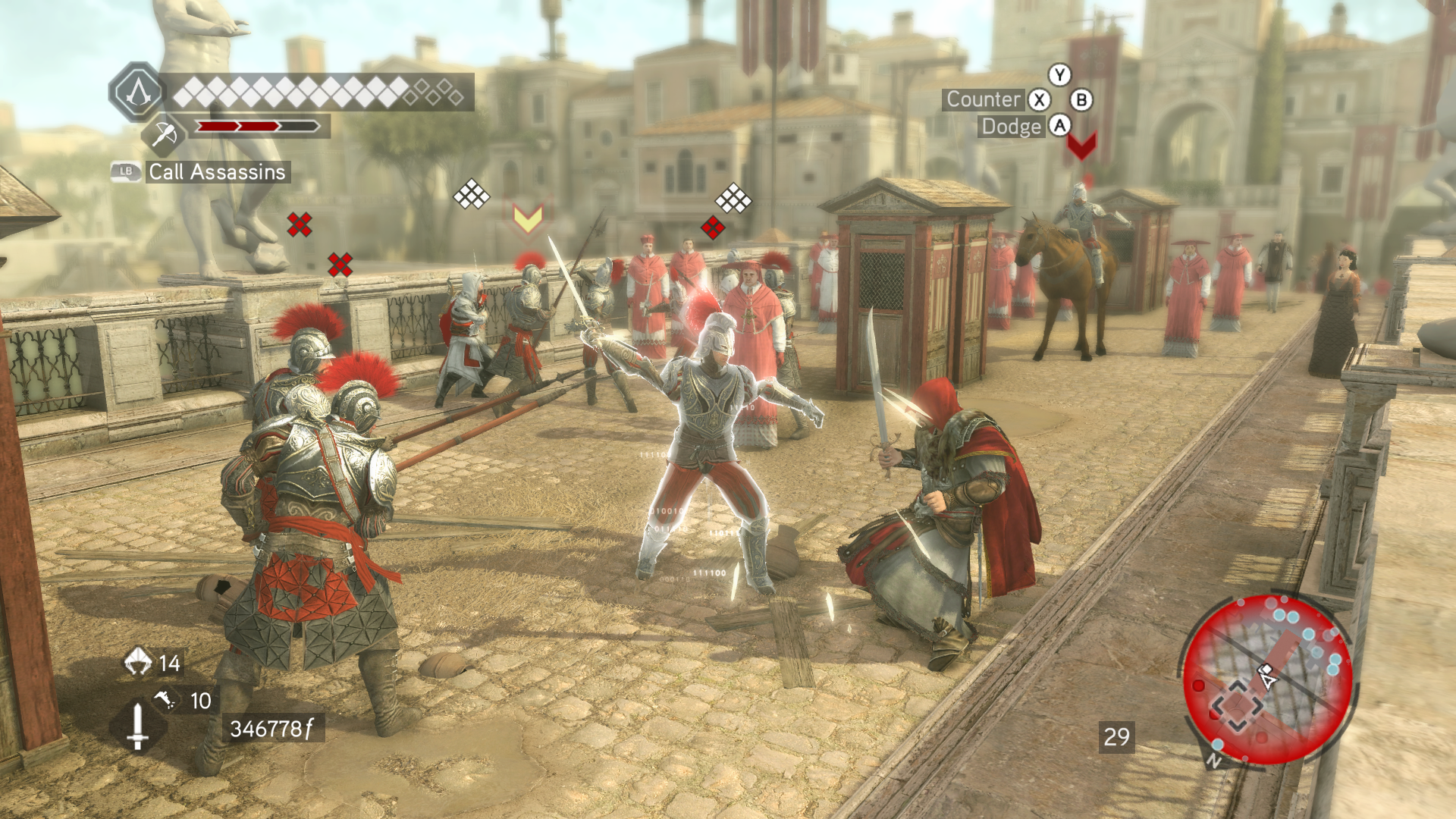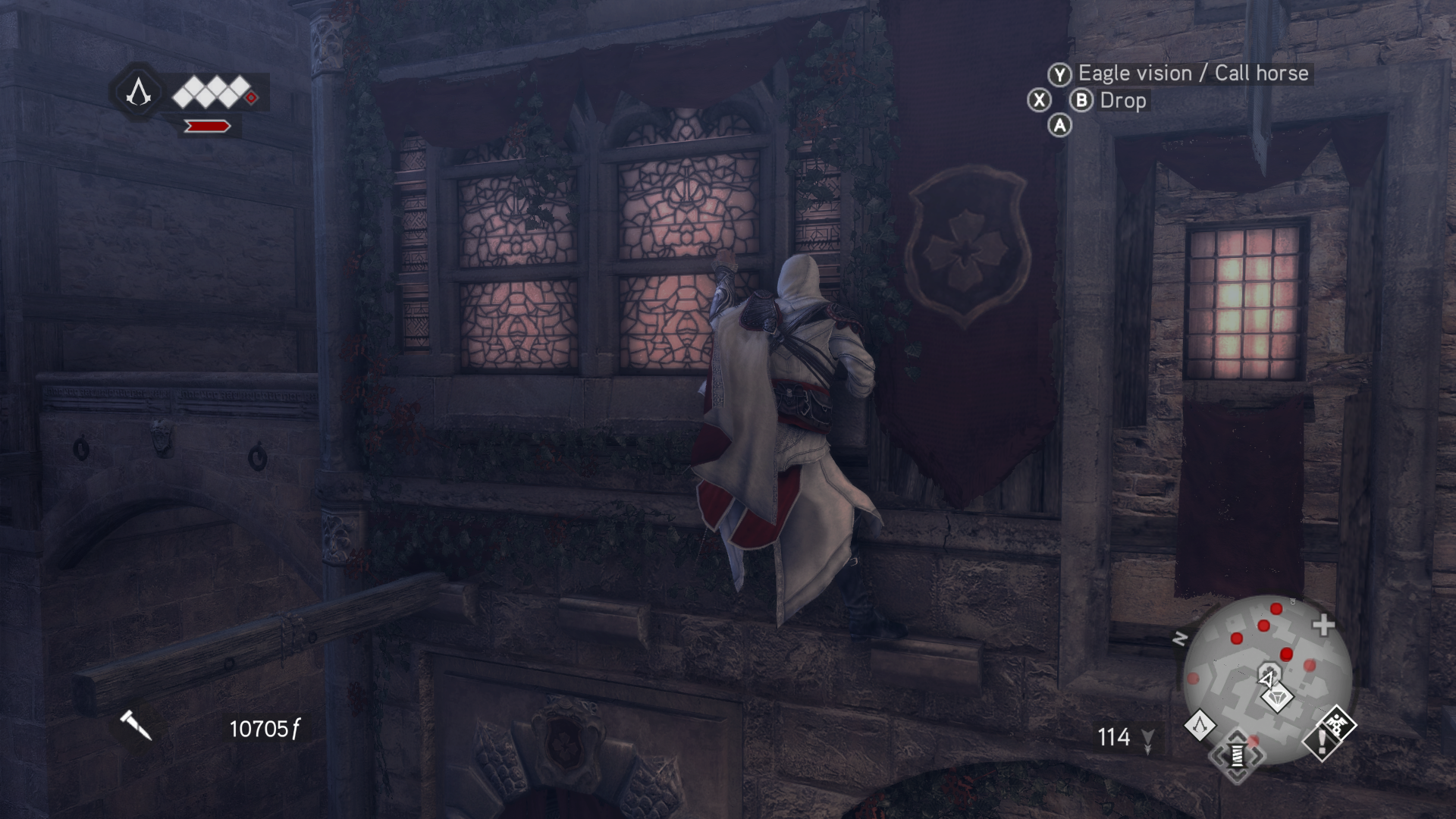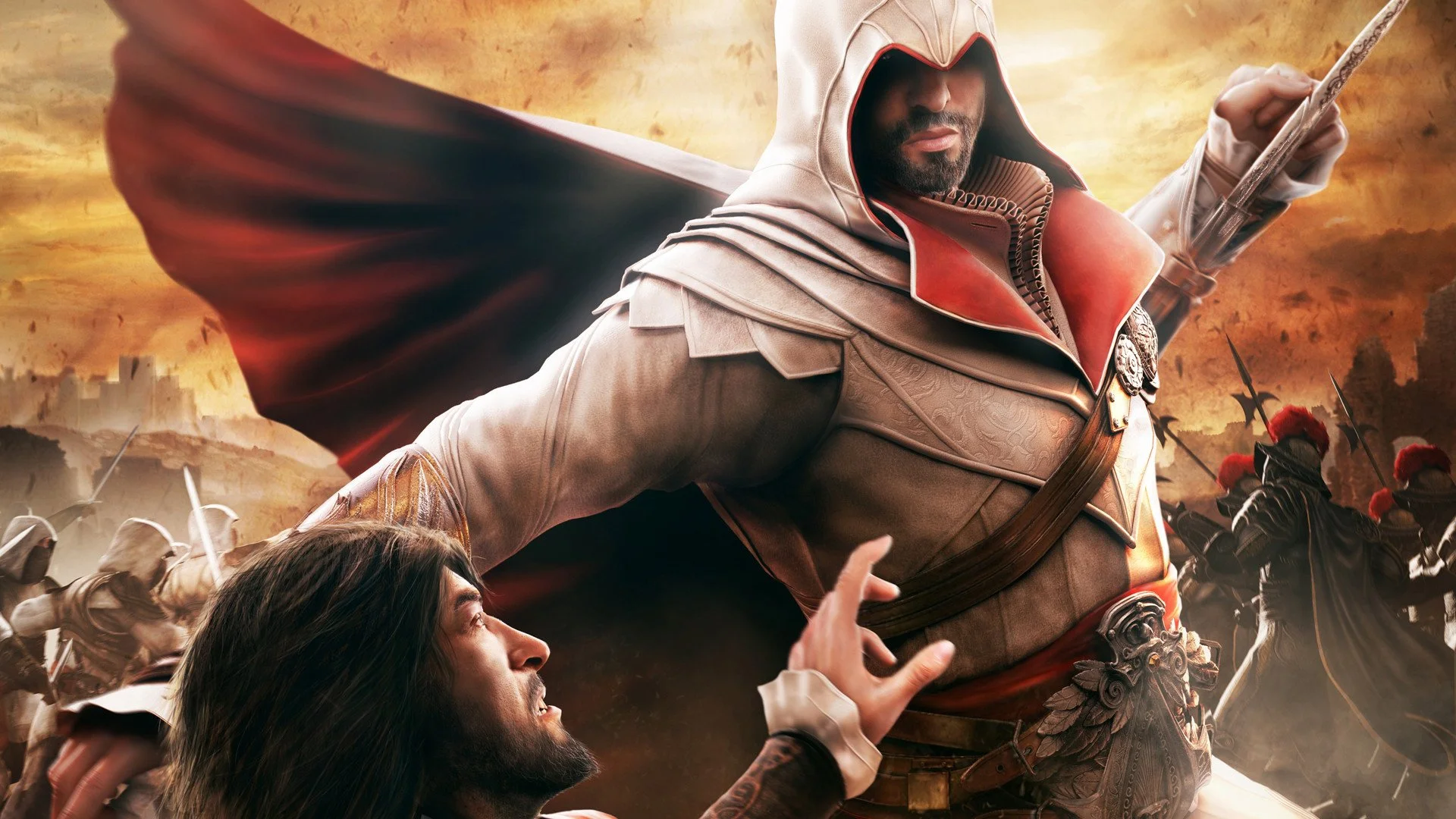Assassin’s Creed: Brotherhood Review
Played on Xbox One (base)
Developed by Ubisoft Montreal
Released 16th November 2010
This is where the red flags would start to crop up in the ‘Assassin's Creed’ series. Brotherhood is often remembered as one of, if not, the best AC game in the franchise, only rivalled by its predecessor and the later sequel of Black Flag. Before replaying this much beloved and highly rated sequel, I remembered Brotherhood to be not only my favourite AC game but also the best one and how it was one of the best gaming experiences I've ever had. Yet, with this replay, it felt quite underwhelming compared to the high bar it had previously set; maybe I've been nostalgia-baited by anticipating it too much after playing AC2, maybe I've just grown up, matured and started to consume things more critically, or maybe it just hasn't aged well enough.
Either way, this game managed to blast everyone away on launch, with a mighty average Metacritic score of 89, as this would further prove how much of a cash cow the franchise has become for Ubisoft, and, with this game only taking a year to develop and release fully, would position the series on an annual release calendar. This would be for better and worse as on one hand it would allow for more historical badassery to unfold on a more frequent basis. However, it would also signal how Ubisoft would start to prioritise financial gain over creative potency, with the lead creative director of the series, Patrice Désilets, leaving the company for a "creative break". Ubisoft would use this as an opportunity to circumvent his plans to have the game's narrative end as a trilogy and replace it with their own plans of a constant release cycle that would eventually lead to today's state of ‘Assassin's Creed’ games.
Story
ACB's story may follow a very similar journey to that of its predecessor, but its unravelling of the plot feels more polished. A common trope found in this game is that it's practically the same as AC2, albeit more refined and that applies heavily to the story as well. The narrative continues the same mystery and focus from its prequel of the present-day team, consisting of Desmond and Lucy, looking for the hidden location of an Eden Artifact. They use the series' standard historical simulation to find it and in those days of the Italian Renaissance, it once again follows Ezio on yet another mission for revenge which coincides with the war between Assassins and Templars. The only major difference between the 2009 story and this one is that the characters are all more educated about the factions and their ties to the Piece of Eden. There is also some additional polish applied with the group of antagonists being more streamlined in size and having far more memorable and entertaining characteristics than that of AC2's villainous roster.
However, an additional set of refinements doesn't make up for what detracted from my experience. The whole lone-wolf approach to revenge narratives is quite tiresome, especially in today's climate, and for that narrative not only to be repeated in the next game but also with the same protagonist and setting is quite draining of the entertainment that comes from assassinating people in Renaissance Italy. While the game does make some effort to deter away from it, with a greater focus on relying on your allies for help and focusing more on retrieving the Piece of Eden, that bitter taste will still linger on while you play. It's not so bad that it ruins the whole 15-hour-long campaign, in fact, I'd generally consider the story to be better than AC2 when faced with the facts, as the way it handles its characters is more nuanced. However, it won't feel like it if you're playing through Ezio's trilogy consecutively due to it bearing too many similarities to feel like a fresh, new experience.
The Desmond intersections are toned down for this game seeing as there wasn't much to explore in the present-day arc before the encore, however, they were of a similar quality to that of AC2 in terms of how intriguing they were.
As for the mythological aspect of this game; well, 3 reviews deep into the series and my opinion on them hasn't changed. They are such tonal whiplashes that detract from the political and historical conflicts that the rest of the game offers, and while the Piece of Eden is so integral to the plot, its mythical appearance is subdued for the better, going as far as to seem entertaining in catalysing the tale of the Assassins (though I wouldn't be surprised if this were simply a case of the franchise Stockholm Syndrome-ing me).
Gameplay
A lot of my enjoyment with this game mostly stems from how fluid it feels while remaining familiar with AC2's core DNA. Compared to the modern attempts at video game parkour, or third-person hack'n'slashes, ACB does lack in a couple of departments regarding depth, most of which are due to the game's age and its short developmental cycle. While they aren't massive dips in quality, they do make the game severely easier and the apparent ease you'll have traversing the landscape or fighting hordes of enemies might put some people off from playing the game. However, at this point in the series, the games have started to focus more on having a stylish flair that exudes that badass feeling you crave in playing as historical assassins and they portray this through the slicker animations, higher intensity action sequences and overall faster pacing of gameplay.
In comparison to its predecessor, and even as a standalone experience, the slight adjustments made to make the game feel more sleek are definitely welcome. In terms of combat, its main principles have remained the same with a basic attack, a parry, a dodge and a grab. However, in addition to this, there is now the Chained Execution mechanic which allows you to string up Execution animations on all the enemies around you, regardless of how much health they have, as long as you don't get hit in the process. This addition amplifies those traits mentioned earlier in the review: style and speed, and while it is one of the causes of what makes the game significantly easier, the micro-dopamine burst you get from flawlessly decimating a battalion of soldiers feels incredible. The game does try to counteract this difficulty issue by making enemies more aggressive, limiting which enemies you can parry and even having some of them cause trouble by grabbing you, however, even with these countermeasures, the game's combat remains ridiculously easy.
As for the stealth, nearly everything is the same. While that wouldn't necessarily of been a bad thing, the only new tool you can get and use for assassinations makes nearly every other effort in the game redundant. The Crossbow is so overpowered for absolutely no reason. It's silent, has an ammo capacity of up to 30 shots, has a quick charge-up time, maximum potential range, and it one-shots all enemies in the game, including the armoured beefcakes that can knock you on your ass within one swing. At first, this makes stealthing enemy outposts great because you can deal with anyone regardless of range, yet, as the game progresses, you develop an overreliance on the crossbow, to the point I had to forcibly stop myself from using it because it was sapping much of the joy away.
However, a fantastic feature that ACB adds and uses as a unique selling point is the Assassin Guild feature. The Assassin Guild is something I've seen people have mixed opinions on, but personally, I loved it as it really emphasises that 'Brotherhood' aesthetic of the game. This new mechanic allows you to hire recruits into the Assassin Brotherhood and send them in to assassinate someone for you, or help by joining your fight. You could also level them up by sending them on global missions which basically meant you couldn't use them for 20 minutes, but the plus side is that they'd have better gear and better techniques like unlocking the double assassination. I was fond of this system but it was obvious it could've been expanded upon beyond pressing one button to summon an ally and waiting in real-time for them to level up.
As for the parkour, it's all the same as it was previously. It's so unchanged that there is only one new feature to aid the freerunning and that's the addition of the lifts which are scattered around and help you scale a building in an instant. This provides great momentum, acting as a superb speed starter to the already rapid and fairly smooth parkour, and being able to catch an enemy in these was satisfying.
The open-world aspect of ACB was as wonderous as it was in AC2 and it still holds up to this day. This time around, the map is concentrated only on the City of Rome dividing it into 4 districts compared to AC2's several cities. This results in the map feeling bigger as you're able to traverse its entirety without any loading screens, despite it technically being smaller in scale. Each district feels distinct in terms of how you traverse and how you approach its objectives with the Centro district having gigantic buildings and dense architecture for the assassin parkour to flourish while the Campagna district had many villages clustered together, with each feeling like a mini playground of its own. The only massive detriment that the whole game has is more of a nitpick for me as the horse that you're able to call in at any moment is quite slow and not too dissimilar to the player's running speed making it feel quite useless when travelling such a broad environment. Despite this, the city feels relatively interactable with how many optional activities you can partake in: Guild activities like fist-fighting tournaments, side missions from Guilds or vendors, assassination contracts and the Borgia towers which essientally set in stone the classic "outpost liberation" trope in so many open-world games. These activities are quite bare and not that different from AC2 in terms of structure, but doing them provided more entertainment than harm to my experience with the game.
Striving for a 100% completion in ACB was one of the most tedious completions that I've had to deal with as this game simply asked for too much out of me. It's not that it had an overwhelming amount of collectables or side quests (remaining at a similar level to AC2 of 100 collectables), but it's that I had to essientally repeat the process all over again; a process, that I had already undergone in AC2. "If it ain't broke, don't fix it" is a decent quote to follow if you're developing a sequel in the span of a year, but sometimes it would be so much better if changes of this scale did occur. Collecting the 100 Borgia Flags wasn't bad because you could buy Map locations for them and the side quests themselves were really enjoyable dives into the world of Renaissance Italy, more specifically the Christina's Requests which provided some fun, bonus context to the life of Ezio. However, where my displeasure resides, is in the fact that I had to basically do all of this again, despite having just done it in AC2, so if you do plan to 100% ACB, give yourself enough time after its predecessor to decompress. Another reason why the 100% didn't feel as great is due to the synchronisation needed for each mission. With ACB, every mission, either Story or optional, had a bonus challenge attached to it and while some of them were fun, like 'don't harm anyone' or 'kill your target with your pistol', others were infuriating to redo like 'don't take any damage' or 'remain undetected' for a 10-minute mission. These missions are doable and aren't literal hellscapes like so many others would describe them as, but it's not as if they made some missions any more enjoyable.
Maybe I played this too soon after spending 35 hours on AC2 because my 37 hours here ended up feeling more like an expansion rather than a standalone sequel. Despite this, the game is still fun to play, which is the objective many games forget to aim for.
Characters
The characters this time around feel greater in presence and overall better written. While the over-the-top voice acting protrudes out at you, and some characters' dialogue takes a dip in quality despite being more fleshed out (looking at you Shaun Hastings), it is a generally great improvement on all fronts. Ezio feels like a wiser, less temperamental assassin in all the right ways, retaining his wit and charm. At the same time, the roster of villains, like Cesare Borgia, does come across as plain in incentive and writing, but the dramatic voice acting works in its favour.
Atmosphere
The atmosphere is as great as it was in AC2 and while that has been quite a bit of a detriment for the rest of the review, the fact that I've essientally spent around 70 hours in Renaissance Italy with the same beautiful soundtrack is evident that the virtue of Rome is strong enough to keep you engaged throughout, without boring you. The restriction to just Rome and its open, more populated fields makes the liveliness and detailed memorabilia stand out more to nearly the same level of optical satisfaction of AC2. In addition, the game received a visual uplift despite its 1-year development period, looking noticeably better and more refined than previously. The game has remained the same in quality for audible design and given the fact that the previous game's music and sound effects were so elite, this continuation of excellence is possibly as impressive as the uplift in visual calibre.
The Da Vinci Disappearance (DLC)
While normally I would review the DLC after giving the score for the base game, Brotherhood's DLC consisted of only adding a storyline that is resolved within a couple of missions. As a whole, I really enjoyed this DLC with the story balancing the loveable characteristics of Ezio and the supporting cast, with the absurdity of the Pieces of Eden and whatever history they have. The level design worked to great effect as the parkour moments came across as effortless and the mini-puzzle section towards the end was as enjoyable as it was brief. In other words, this DLC was short and sweet.
Story - 7.5/10
Gameplay - 7.5/10
Characters - 6.7/10
Atmosphere - 9/10
DLC - 7/10
GOOD
While it doesn't feel like a new experience, either because it is too identical to AC2 or because it's design and structure have become the norm in games nowadays, it still is an enjoyable and solid entry into the franchise.




